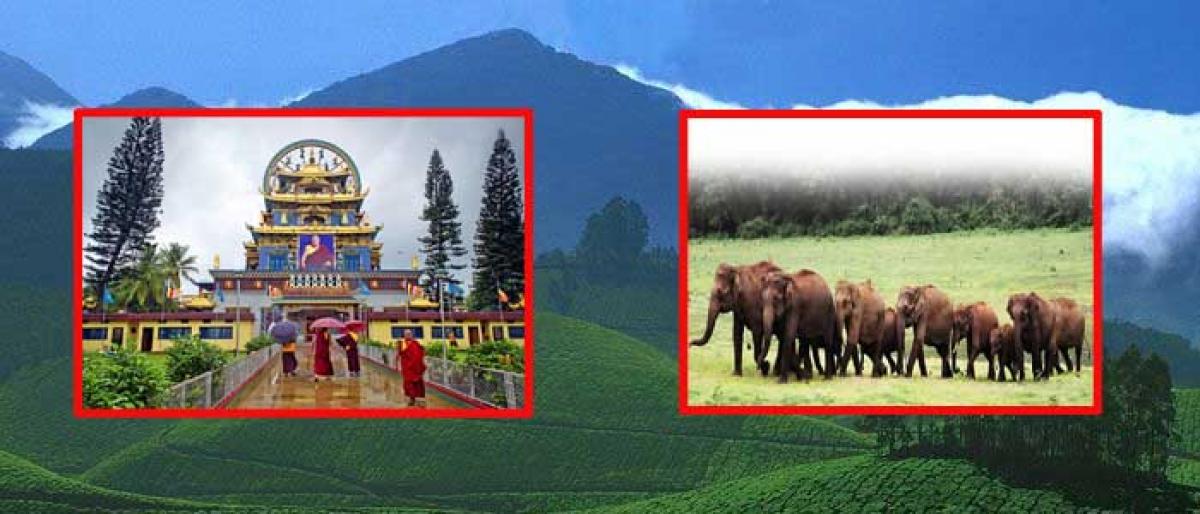Live
- Gold rates in Visakhapatnam slashes, check the rates on 19 April 2024
- Filing of nomination commences
- Adireddy Srinivas files nomination
- Hyderabad: 42 candidates file nominations on first day
- Sharmila accuses CM of living in ivory tower
- Gurumoorthy appears to be ahead of pack
- CM bus yatra draws huge crowds
- From a doctor to a politician, Thanuja Rani looks forward to serve society
- Hyderabad: ‘Modi govt contributed Rs10 lakh cr for TS development in a decade’
- YSRCP, TDP candidates file nominations
Just In

Last week a friend asked me for travel advice on Coorg — when to go, what to see and buy and so on. It triggered many memories of the place and of the many trips I had made to it over the years.
Tucked in the western ghats in Karnataka, Coorg is best known for its coffee and people. There is something for everyone in this picturesque locale
Last week a friend asked me for travel advice on Coorg — when to go, what to see and buy and so on. It triggered many memories of the place and of the many trips I had made to it over the years.
Coorg's lesser-known name is Kodagu. A rural district in Karnataka. It has been a popular holiday destination for long and especially for people of the state and surrounding ones. There are many things that draw people to Coorg – coffee plantations, homestays, which offer a slice of local life, an exotic Tibetan settlement, the wild western ghats, scrumptious local delicacies and wildlife sighting too.
The picturesque coffee plantations of Coorg are great to drive around. They are a photographer's delight and are nowadays featuring in many south Indian films too. It is not only their scenic beauty which fascinates; Many plantations offer guided tours so you can see the various stages of coffee-making from the seeds to the powder and you can see carpets of coffee seeds laid out to dry in the sun as also piles of soap nut before houses.
Among the best trekking options in south India are contained in the Western Ghats which are now part of the UNESCO World Heritage List for their rich biodiversity. Waterfalls add to the scenic beauty. Some treks require permission from the forest department. Given its location on the eastern slopes of the Western Ghats. Coorg is a paradise for naturalists and even the lay nature lover will discern a vast range of flowers, birds and butterflies.
About 40 km south of Madikeri, is the Tibetan settlement at Bylakuppe built on land donated to Tibetan refugees by the Union Government. Here is the beautiful Namdroling monastery—once I entered, it felt like I was in Bhutan or Thailand's monasteries; so authentically have the Tibetans recreated the Buddhist ethos. Stores here sell authentic handicrafts and hand-woven items though they are relatively expensive.
You can get up close and personal with elephants at the Dubare Elephant camp at the Cauvery river. Watching them bathe in the river and even helping in their scrubbing is a special delight for visiting urbanites and children particularly.
For sighting wildlife in more natural habitats, you can visit the Nagarhole National Park. A wide variety of safaris are on offer here. The tiger is a big draw—this park was part of Project Tiger. Bison, bear, leopards, reptiles, and hundreds of species of birds, etc are the other inhabitants.
Homestays have caught on in a great way in Coorg. I had never experienced a homestay in this area but had a close look at a few. Provided you find a really good one they are a great way to enjoy a slice of local life. From their food and architecture to their songs, marriage customs and attire including the way they drape their sarees. there is a fascinating Kodava culture to discover.
Coorg is a foodie’s delight too with its varied cuisine. Being a vegetarian, I have never tasted its most famous dish--Pandi Curry but have heard my carnivore friends rave about it. This is pork in a sour and spicy gravy made from Kachampuli, a black vinegar made from black kokum fruit. My favourites are the bamboo-shoot curry, Puttu or steamed rice dishes like Nooputtu which is a bit like Kerala's idiyappam, Paaputtu and Akki roti with pumpkin curry or Kaad mango curry made from wild mangoes which give it a delightful tartness.
Rice and coconut are integral to the local cuisine and non-vegetarian dishes like mutton and chicken are popular. You will also find on the table local honey, chutneys of smoked or dried meat and fish, and pickles of mushroom, gooseberries and tender bamboo.
For my friend's shopping list, I recommended the local wines (made from local fruits) knowing she and her husband were wine connoisseurs. The gooseberry wine generally tops that list of wines for such people. The honey is among the best in the country and coffee seeds and powder are favourite purchases of visitors. You can carry back spices and locally made jams and pickles. The artefacts at Bylakuppe and items from discarded wood from plantations are other options.

© 2024 Hyderabad Media House Limited/The Hans India. All rights reserved. Powered by hocalwire.com







